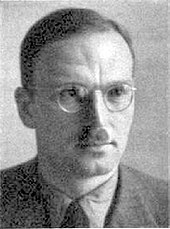Rudolf Raschka
Rudolf Raschka (born October 12, 1907 in Mährisch-Budwitz , † December 2, 1948 in Weinsberg ) was an engineer, farmer and politician in the Greater German Reich . He worked as a country farmer's leader and was a member of the National Socialist Reichstag from 1938 .
Raschka first received his education at the Gymnasium in Iglau (today Jihlava) and then went to the University of Natural Resources and Life Sciences in Vienna . After that he was first Gau managing director of the organization of German farmers in Moravia in Mährisch Trübau (today Moravská Třebová), then from 1933 to 1935 director of the farming school in Groß Ullersdorf . Raschka was a member of the Comradeship Association for National and Social Political Education , an association that was based on Othmar Spann's theories of an authoritarian corporate state . In May 1935 he joined the Sudeten German Party (SdP). Until October 1938 he headed the SdP main office for agricultural policy and peasant issues and the central office of the Sudeten German peasantry in Prague . He was also a member of the Sudeten German Peasant Council. In August 1938 he became the SdP's representative for population policy and race issues.
After the incorporation of the Sudeten areas into the German Reich as a result of the Munich Agreement , Raschka was a member of the NSDAP from November 1938 . At the same time, he took on tasks as a country farmer's leader and Gauamtsleiter of the Office for Agricultural Policy of the Reichsgaus Sudetenland based in Reichenberg (today Liberec). In December 1938 he received a mandate in the National Socialist Reichstag. In March 1939 he joined the SS , in which he was last promoted to Obersturmbannführer in November 1940 . Raschka was chairman of the supervisory board of the Deutsche Bodenverkehrsgenossenschaft and a member of the supervisory board of the German credit institution in Reichenberg.
In January 1943, Raschka was demoted to an SS man and expelled from the SS. In proceedings before an SS court, he was accused of intent to act against the interests of the SS. In addition, his former membership in the Comradeship Association was held against him. In February 1943 he lost his offices as a country farmer and district manager. The Supreme Party Court of the NSDAP excluded him from the party in May 1943. Raschka's mandate in the Reichstag was declared invalid in September 1943; Rudolf Schittenhelm moved up for him .
literature
- Joachim Lilla , Martin Döring, Andreas Schulz: extras in uniform: the members of the Reichstag 1933–1945. A biographical manual. Including the Volkish and National Socialist members of the Reichstag from May 1924 . Droste, Düsseldorf 2004, ISBN 3-7700-5254-4 , p. 491 .
Web links
- Literature by and about Rudolf Raschka in the catalog of the German National Library
- Rudolf Raschka in the database of members of the Reichstag
Individual evidence
- ↑ Stanislaw Biman: Seduced and powerless? The share of the Sudeten Germans in the administration of the Reichsgau Sudetenland. In: Monika Glettler (Ed.): Divided, occupied, dominated. Czechoslovakia 1938–1945. Protectorate of Bohemia and Moravia, Slovakia. Klartext, Essen 2004, ISBN 3-89861-126-4 , pp. 155–184, here p. 173.
| personal data | |
|---|---|
| SURNAME | Raschka, Rudolf |
| BRIEF DESCRIPTION | Sudeten German engineer, farmer and politician (NSDAP), MdR |
| DATE OF BIRTH | October 12, 1907 |
| PLACE OF BIRTH | Moravian Budwitz |
| DATE OF DEATH | December 2, 1948 |
| Place of death | Weinsberg , Baden-Wuerttemberg |
